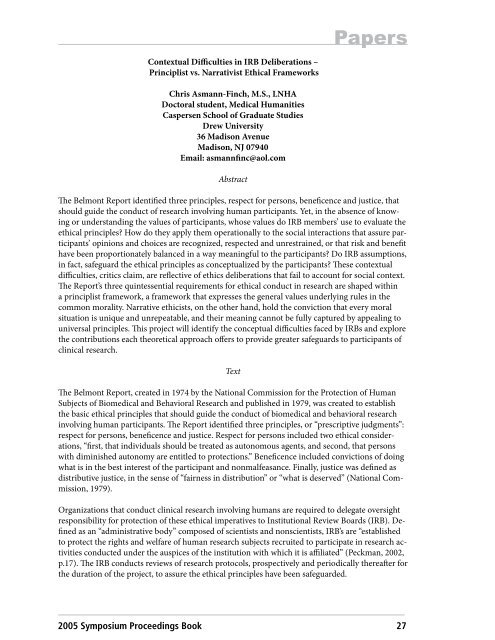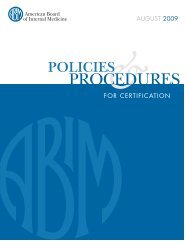The SRA Symposium - College of Medicine
The SRA Symposium - College of Medicine
The SRA Symposium - College of Medicine
Create successful ePaper yourself
Turn your PDF publications into a flip-book with our unique Google optimized e-Paper software.
Contextual Difficulties in IRB Deliberations –<br />
Principlist vs. Narrativist Ethical Frameworks<br />
Chris Asmann-Finch, M.S., LNHA<br />
Doctoral student, Medical Humanities<br />
Caspersen School <strong>of</strong> Graduate Studies<br />
Drew University<br />
36 Madison Avenue<br />
Madison, NJ 07940<br />
Email: asmannfinc@aol.com<br />
Abstract<br />
<strong>The</strong> Belmont Report identified three principles, respect for persons, beneficence and justice, that<br />
should guide the conduct <strong>of</strong> research involving human participants. Yet, in the absence <strong>of</strong> knowing<br />
or understanding the values <strong>of</strong> participants, whose values do IRB members’ use to evaluate the<br />
ethical principles? How do they apply them operationally to the social interactions that assure participants’<br />
opinions and choices are recognized, respected and unrestrained, or that risk and benefit<br />
have been proportionately balanced in a way meaningful to the participants? Do IRB assumptions,<br />
in fact, safeguard the ethical principles as conceptualized by the participants? <strong>The</strong>se contextual<br />
difficulties, critics claim, are reflective <strong>of</strong> ethics deliberations that fail to account for social context.<br />
<strong>The</strong> Report’s three quintessential requirements for ethical conduct in research are shaped within<br />
a principlist framework, a framework that expresses the general values underlying rules in the<br />
common morality. Narrative ethicists, on the other hand, hold the conviction that every moral<br />
situation is unique and unrepeatable, and their meaning cannot be fully captured by appealing to<br />
universal principles. This project will identify the conceptual difficulties faced by IRBs and explore<br />
the contributions each theoretical approach <strong>of</strong>fers to provide greater safeguards to participants <strong>of</strong><br />
clinical research.<br />
Text<br />
Papers<br />
<strong>The</strong> Belmont Report, created in 1974 by the National Commission for the Protection <strong>of</strong> Human<br />
Subjects <strong>of</strong> Biomedical and Behavioral Research and published in 1979, was created to establish<br />
the basic ethical principles that should guide the conduct <strong>of</strong> biomedical and behavioral research<br />
involving human participants. <strong>The</strong> Report identified three principles, or “prescriptive judgments”:<br />
respect for persons, beneficence and justice. Respect for persons included two ethical considerations,<br />
“first, that individuals should be treated as autonomous agents, and second, that persons<br />
with diminished autonomy are entitled to protections.” Beneficence included convictions <strong>of</strong> doing<br />
what is in the best interest <strong>of</strong> the participant and nonmalfeasance. Finally, justice was defined as<br />
distributive justice, in the sense <strong>of</strong> “fairness in distribution” or “what is deserved” (National Commission,<br />
1979).<br />
Organizations that conduct clinical research involving humans are required to delegate oversight<br />
responsibility for protection <strong>of</strong> these ethical imperatives to Institutional Review Boards (IRB). Defined<br />
as an “administrative body” composed <strong>of</strong> scientists and nonscientists, IRB’s are “established<br />
to protect the rights and welfare <strong>of</strong> human research subjects recruited to participate in research activities<br />
conducted under the auspices <strong>of</strong> the institution with which it is affiliated” (Peckman, 2002,<br />
p.17). <strong>The</strong> IRB conducts reviews <strong>of</strong> research protocols, prospectively and periodically thereafter for<br />
the duration <strong>of</strong> the project, to assure the ethical principles have been safeguarded.<br />
2005 <strong>Symposium</strong> Proceedings Book 27

















